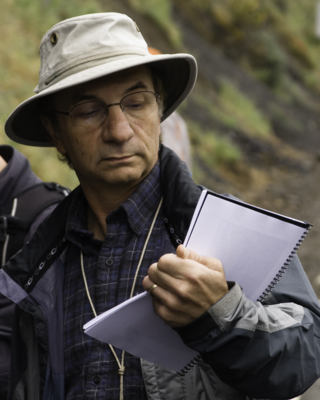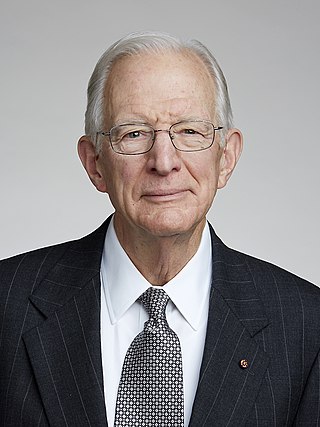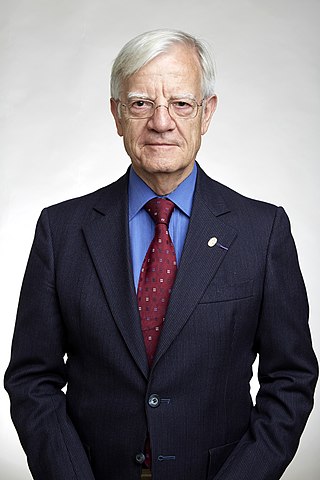Related Research Articles

Friedrich Georg "Fritz" Houtermans was a Dutch-Austrian-German atomic and nuclear physicist and Communist born in Zoppot near Danzig, West Prussia to a Dutch father, who was a wealthy banker. He was brought up in Vienna, where he was educated, and moved to Göttingen when he was 18 to study. It was in Göttingen where he obtained his Ph.D. under James Franck.
Gregor Wentzel was a German physicist known for development of quantum mechanics. Wentzel, Hendrik Kramers, and Léon Brillouin developed the Wentzel–Kramers–Brillouin approximation in 1926. In his early years, he contributed to X-ray spectroscopy, but then broadened out to make contributions to quantum mechanics, quantum electrodynamics, and meson theory.

The Geochemical Society is a nonprofit scientific organization founded to encourage the application of chemistry to solve problems involving geology and cosmology. The society promotes understanding of geochemistry through the annual Goldschmidt Conference, publication of a peer-reviewed journal and electronic newsletter, awards programs recognizing significant accomplishments in the field, and student development programs. The society's offices are located on the campus of the Carnegie Institution for Science in Washington, DC.

Otto Haxel was a German nuclear physicist. During World War II, he worked on the German nuclear energy project. After the war, he was on the staff of the Max Planck Institute for Physics in Göttingen. From 1950 to 1974, he was an ordinarius professor of physics at the University of Heidelberg, where he fostered the use of nuclear physics in environmental physics; this led to the founding of the Institute of Environmental Physics in 1975. During 1956 and 1957, he was a member of the Nuclear Physics Working Group of the German Atomic Energy Commission. From 1970 to 1975, he was the Scientific and Technical Managing Director of the Karlsruhe Research Center.
Geoffrey Eglinton, FRS was a British chemist and emeritus professor and senior research fellow in earth sciences at the University of Bristol.
The European Association of Geochemistry (EAG) is a pan-European organization founded to promotes geochemical research. The EAG organizes conferences, meetings and educational courses for geochemists in Europe, including the Goldschmidt Conference which it co-sponsors with the North American Geochemical Society.
The F.W. Clarke Medal is an annual award presented by the Geochemical Society to an early-career scientist for a single outstanding contribution to geochemistry or cosmochemistry, published either as a single paper or a series of papers on a single topic. The award is named after Frank Wigglesworth Clarke, one of the founding fathers of geochemistry. F.W. Clarke medal have in the past been disproportionately given to white men, though this is changing.

Donald James DePaolo is an American professor of geochemistry in the department of earth and planetary science at the University of California, Berkeley and associate laboratory director for energy and environmental sciences at the Lawrence Berkeley National Laboratory.

Sir Alexander Norman Halliday is a British geochemist and academic who is the Founding Dean Emeritus of the Columbia Climate School, and Former Director of the Earth Institute at Columbia University. He joined the Earth Institute in April 2018, after spending more than a decade at the Department of Earth Sciences at the University of Oxford, during which time he was dean of science and engineering. He is also a professor of Earth and Environmental Sciences at Columbia University.
Houtermans may refer to
Isabel Patricia Montañez is a paleoclimatologist specializing in geochemical records of ancient climate change. She is a distinguished professor and a Chancellor's Leadership Professor in the department of earth and planetary sciences at University of California, Davis. As of 2021, Montañez is the director of the UC Davis Institute of the Environment.
Katherine H. Freeman is the Evan Pugh University Professor of Geosciences at Pennsylvania State University and a co-editor of the peer-reviewed scientific journal, Annual Review of Earth and Planetary Sciences. Her research interests are organic geochemistry, isotopic biogeochemistry, paleoclimate and astrobiology.

John Michael Hayes was an American oceanographer. He worked at Indiana University Bloomington, and Woods Hole Oceanographic Institution in Woods Hole, Massachusetts.
Sethunathasarma Krishnaswami, popularly known as Swami, was an Indian geochemist and an honorary scientist at the geosciences division of the Physical Research Laboratory. He was known for his studies on low temperature geochemistry and was an elected fellow of the Indian Academy of Sciences, Indian National Science Academy, The World Academy of Sciences, National Academy of Sciences, India, American Geophysical Union, Geochemical Society and European Association of Geochemistry (2003). The Council of Scientific and Industrial Research, the apex agency of the Government of India for scientific research, awarded him the Shanti Swarup Bhatnagar Prize for Science and Technology, one of the highest Indian science awards for his contributions to Earth, atmosphere, ocean and planetary Sciences in 1984.
Erik Harold Hauri was an American geochemist at the Carnegie Institution for Science. He researched the movement of matter inside planets and how volatile compounds such as water originated on Earth and other planetary bodies, and their effects on volcanic systems.

Albrecht (Al) Werner Hofmann, ForMemRS, is emeritus professor at the Max Planck Institute for Chemistry and an adjunct professor at Columbia University. He is best known for his contributions to the field of geochemistry.
William Howard Casey is distinguished professor of chemistry and professor of geology at the University of California, Davis. He has made major contributions in the fields of aqueous geochemistry and inorganic solution chemistry. He has in particular received international awards for his work on the use of heteronuclear ambient and high-pressure NMR spectroscopic and mass spectrometric techniques in elucidation the solution chemistry of discrete metal oxide clusters such as aluminum hydroxides and polyoxoniobates, and has been elected Fellow of the American Chemical Society and Fellow of the American Association for the Advancement of Science. The mineral Caseyite is named in his honour.
T. Mark Harrison is an isotope geochemist based in California. He is Distinguished Professor of Geochemistry in the Department of Earth, Planetary and Space Sciences, University of California – Los Angeles.

Wendy Li-Wen Mao is an American geologist who is a professor at SLAC National Accelerator Laboratory. Her research considers the mineral physics of planetary interiors, new materials under extreme environments and novel characterisation techniques. In 2021 she was elected Fellow of the European Association of Geochemistry.
Nicolas Dauphas is a planetary scientist and isotope geochemist. He is faculty in the Department of the Geophysical Sciences and Enrico Fermi Institute at the University of Chicago. His research focuses on isotope geochemistry and cosmochemistry. He studies the origin and evolution of planets and other objects in the solar system by analyzing the natural distributions of elements and their isotopes using mass spectrometers.
References
- ↑ "Awards". European Association of Geochemistry. Retrieved 21 June 2015.
- ↑ Pourret, Olivier; Anand, Pallavi; Arndt, Sandra; Bots, Pieter; Dosseto, Anthony; Li, Zimin; Marin Carbonne, Johanna; Middleton, Jennifer; Ngwenya, Bryne; j. v. Riches, Amy (2021). "Diversity, Equity, and Inclusion: Tackling under-representation and recognition of talents in Geochemistry and Cosmochemistry". Geochimica et Cosmochimica Acta. doi: 10.1016/j.gca.2021.05.054 . hdl: 20.500.11820/a40f7136-75ac-400d-bba1-07b8cf1fd766 .